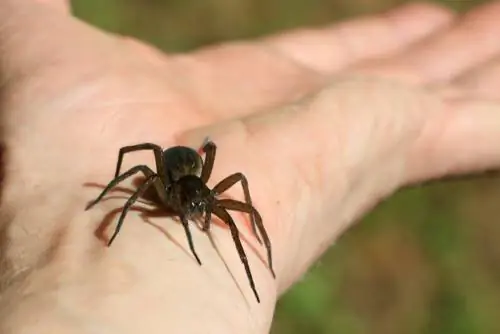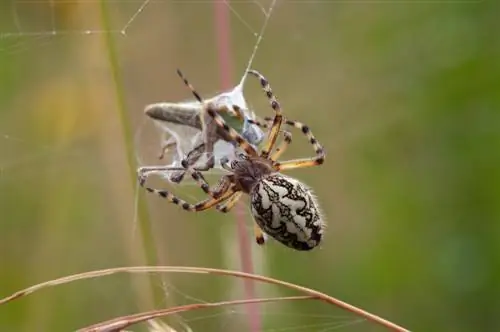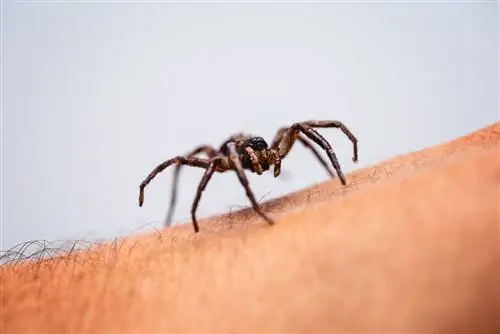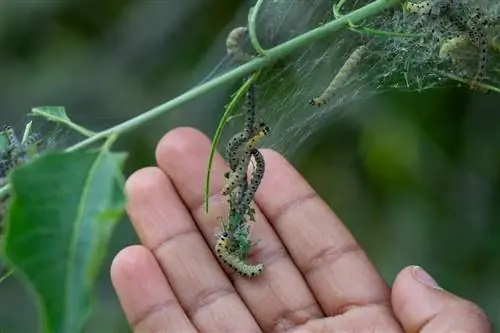- Author admin leonars@hobbygardeners.com.
- Public 2023-12-16 16:46.
- Last modified 2025-01-23 11:22.
Every autumn it's that time again: Especially after a warm and dry summer, countless house spiders get lost in apartments, sheds, garages and houses. Because of their sheer size, many people are afraid of them, but is their bite actually dangerous?
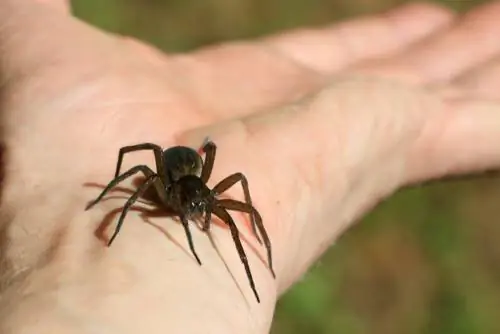
Is the bite of a house spider spider dangerous?
The bite of a house spider (Tegenaria domestica) is harmless to humans. Although it can be painful, it does not cause symptoms of poisoning. To reduce swelling and itching, it is recommended to cool the bite site or use aloe vera or onions.
Can the house spider bite?
The house spider (Tegenaria domestica), also known as the “cellar spider” or “house spider” because of its preferred habitat, scares many people because of its sheer size. The actual body is relatively small at around one centimeter long, but the long legs can reach a span of up to ten centimeters. The animals are colored light to dark brown, becoming lighter after a molt and then darkening.
The shy animals are mainly found where they find dark and hard-to-reach places for their web. House spiders mainly settle in cellars, barns, sheds and attics, where they create their webs mainly in cavities and behind cupboards. In summer the species can also be found outdoors, again in sheltered places such as walls or piles of stones.
Angle spiders can bite and can penetrate human skin with their pincers. However, it is rare and unlikely that it will actually come to that: the animals only bite when they feel attacked and see no possibility of escape. It only becomes a problem if the spiders are found in the bedroom, for example, and get into the bed at night. Here, movements of the sleeping person can cause the spider to get under parts of the body or under the blanket and bite there in a panic.
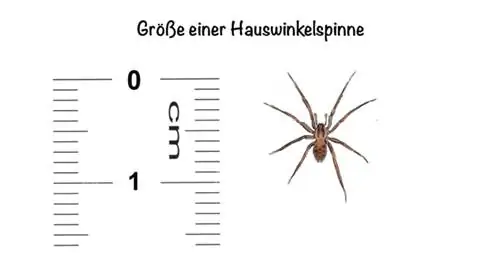
Is the bite of the house spider spider dangerous?
Although house spiders - like all spiders - release a toxin when they bite, this is only poisonous to prey. However, the poison has no effect on humans. Symptoms of poisoning reported on some sites and in forums and necrotic and poorly healing wounds after a spider bite are usually due to a bacterial infection. Like all wild animals, the house angle spider carries bacteria that are transmitted through a bite and can cause painful and lengthy skin infections. However, this only happens very rarely. Furthermore, in rare cases, allergic reactions can occur after repeated spider bites.
What symptoms can occur after a bite?
You probably feel the bite itself like a needle prick: it is painful, but not as much as that of a bee or wasp. Local redness and slight swelling may then occur, which disappear after a few hours. On the other hand, a spreading, painful redness, severe swelling and heat radiating from the wound are clear indications of a bacterial infection that must be treated medically. Allergic symptoms also manifest themselves in a very similar way. In these cases, circulatory problems (e.g. dizziness), problems with balance, rapid heartbeat and/or headaches may also occur. But as already said: These complications only occur very rarely, which is why you shouldn't panic right away.
How should you treat a spider bite?
Instead, you should cool the bite site and possibly coat it with a cooling gel (e.g. Fenistil). For example,is suitable for cooling
- Cooling pads or bags
- Ice cubes wrapped in kitchen towels
- wet and wrung-out cloths as envelopes
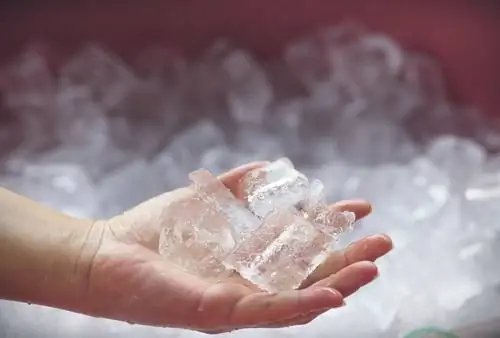
Ice cubes cool and have a decongestant effect
A fresh, cut onion, placed with the cut surface on the wound, also provides relief. Onions also contain antibacterial substances that help prevent inflammation. On the other hand, do you have an aloe vera plant at home? Cut a piece, divide it and place the moist inside on the wound.
Not only cold, but also heat helps against a spider bite. An electronic sting healer (€26.00 on Amazon) not only helps against spider bites, but also against bites and stings from numerous insects and is therefore a sensible investment.
Tip
Never scratch a spider bite to prevent dangerous bacteria from getting into the wound and inflaming it. If this is difficult for you, you can also stick a plaster on the bite site.
Which spiders can still bite?
First of all: Spiders actually only bite very rarely and only when they see no other way out. In addition, the biting tools of most native species are not strong enough to penetrate human skin.
| spider species | Latin name | Appearance | habitat | Toxicity |
|---|---|---|---|---|
| Garden spider | Araneus | brownish with light spots, characteristic cross on the back | in the garden, in nature | only slightly poisonous |
| Curly Hunting Spider | Zoropsidae | light brown | free hunting in nature, invasive species | only slightly poisonous |
| Trembling Spider | Pholcidae | similar to harvestmen | in the house, in nature | only slightly poisonous |
| Nurse Thornfinger | Cheiracanthium punctorium | very light brownish-yellow coloring | in nature, invasive species | poisonous |
| Water spider | Argyroneta aquatica | yellowish to brown | only in water | only slightly poisonous |
This video provides an overview of the most common spider species in Germany:

Excursus
Are there dangerous poisonous spiders in Germany?
There are no really dangerous poisonous spiders in Germany. The nurse's thorn finger, the water spider and the cross spider are considered "poisonous", although the bite of these species rarely requires medical treatment. However, as the climate warms, poisonous species are increasingly migrating from the Mediterranean countries and from other countries, most of which are spreading across southern Germany. It cannot be ruled out that there may be an increased occurrence of truly poisonous spiders here in the future.
Get rid of house spiders and avoid bites
“Spiders are useful animals because they keep mosquitoes and other animals away from us.”
Spiders are very useful animals that keep mosquitoes and other annoying insects away from your home. However, many people are terrified of spiders and would like to get rid of them. Many people resort to brutal means such as the vacuum cleaner (with which the animals are sucked away) or hairspray, which is sprayed on the spiders and sticks them together. Both remedies are of course very effective, but not particularly animal-friendly: the spiders die in a very painful way.
If you dare, you should therefore capture the animals with a glass, close the opening with a sheet of paper and release the spider outside again. In doing so, you are not only doing something good for the spider, but also for nature in general: With the drastic insect death in recent years, arachnids have also declined sharply, so that some species are now endangered.
What really helps against house spiders
In addition to the tried and tested glass and cardboard trick, there are other methods to keep the house spider out of the apartment:
- Insect screens: Close the windows and balcony and patio doors with close-meshed insect screens, then spiders and other creatures will come back into the house.
- Tidy and cleanliness: Keep your apartment and house tidy and clean. For example, do not leave dirty laundry on the floor, avoid dark and hard-to-reach corners (e.g. gaps behind cupboards) and clean all corners and floors regularly. A cleaning product with a lemon scent is recommended, as spiders do not like this scent.
- Close loopholes: Especially in old buildings with wooden floors and in old houses, spiders get into the house in other ways than through the window. Close possible loopholes and hiding places well, such as skirting boards or poorly closing entrance doors. Spraying potential loopholes with lemon or lavender oil has also proven effective at keeping spiders away.
- Ultrasonic plug: Simply plug this into a socket. The device emits a sound in the ultrasonic range that humans cannot hear - but spiders can. They can't tolerate the frequency and stay away.
- Spider Catcher: This device, also known as a spider grabber, helps you catch the spiders without touching them. The animals are not injured and can then be released outside again.
Attention, spiders in the apartment! ? You can see what you can do against the unwanted guests in the video. spider spiders house angle spider tipsandtricks tips tip spiderweb homeremedies scent
A post shared by RND.de (@rnd.de) on Oct 16, 2019 at 4:59am PDT
Excursus
Do grandma’s old home remedies help against spiders?
Grandmothers like to recommend strongly scented products such as lemon, lavender, eucalyptus, peppermint or vinegar to ward off spiders. The remedies should be filled into a spray bottle and sprayed either directly onto the spider itself or into corners of the room that spiders like to frequent. However, the benefits are controversial: studies have shown that garden spiders in particular do not care much about such smells and are not impressed by them. However, this may not apply to all spider species, especially since a clean and tidy apartment is the best prophylactic.
Frequently asked questions
How old do house spiders get?
House angle spiders can live up to six years in good conditions (and if no one attacks them with a vacuum cleaner or hairspray beforehand). However, anyone who reaches this age is a true spider Methuselah. Most specimens only live between two and three years, with many falling victim to another predator or humans.
Can house spiders jump?
House angle spiders can run very fast, but so far they have only very rarely been observed jumping. Even if it cannot be ruled out that house spiders cannot jump, such behavior is certainly not typical for this species of spider.
Do house spiders have natural enemies?
The house spider's worst enemy is humans, closely followed by the large trembling spider. This spider, which remains largely peaceful in its web and waits for prey, is a major predator of the house spider. Where there are trembling spiders, the house spiders usually disappear very quickly.
Tip
If all remedies don't help, you can also use an anti-spider spray. However, this should not be used in the apartment or the apartment should be ventilated thoroughly afterwards.

